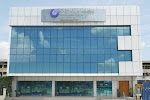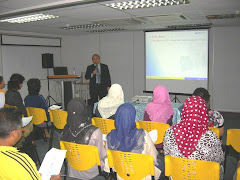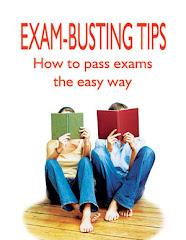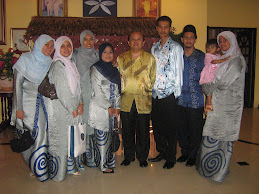For those who have not done so the last date submit your tax return is April 30. The e-filing system implemented a couple of years ago ha made income tax submission return very much easier. With all your data around, you should be able to complete it within 30 minutes if you are doing it the first time.
It took me just 10 minutes to complete and make payment via online as this is my second time I have done so with e-filing. On top of that you can choose make payment by installment subject to approval.
For first timer, you need to get your access id from the nearest income tax office before you could use the e-filing system. Once you have done so, go the Internet and type the following website address: www.hasil.org.my. You will see the following screen below.

Next click on e-filing on your left and you will see the following screen:

If you are a first timer, click Login Kali Pertama followed by your access code provided by Income Tax office. Next choose e-borang where you select the type of tax return.
The system is user friendly and all you need to do is to key in your particulars accurately.
To assist you in your tax return, here are some tips taken from The Star:
===========================================================================
Tips for filling your income tax returns
This first of a three-part ACCA’s Easy Guide to Tax Filing for Employees looks at additional goodies for taxpayers
IT’S tax season again! Employees are required to submit their tax return Form BE for year of assessment (YA) 2008 on or before April 30, where the income assessed is in relation to the basis period of Jan 1 to Dec 31, 2008.
This time around, taxpayers get to enjoy additional tax goodies as part of the Government’s effort to cushion the impact of the economic downturn and higher cost of living on Malaysians.
Specifically, the Government announced via the Budget 2009 proposal and the second stimulus package on March 10, 2009, the following tax benefits for employees, which will take effect in YA2008. These benefits will help reduce taxable income and, consequently, the amount of tax payable.
Compensation for loss of employment
The tax burden is eased for retrenched employees as well as those who opt for voluntary separation schemes.
Employees who are retrenched on or after July 1, 2008 will be granted an income tax exemption of RM10,000 for each completed year of service with the employer or companies in the same group. This also applies to payments for employees who opted for voluntary separation schemes.
Example:
A is a salesperson working in Star New Enterprise from April 1, 2006. Due to the economic downturn in 2009, A was retrenched on Nov 1, 2008 and was paid compensation of RM25,000 for loss of employment. The amount to be taxed in YA2008 will be:
Compensation RM25,000
(Less) Exemption
1.4.2006 – 31.3.2007
1.4.2007 – 31.3.2008
(2 completed years of service)
X RM10,000 RM20,000
RM5,000
If the retrenchment was before July 1, 2008, then the amount exempted for each year of service will be RM6,000.
Tax-exempt employee benefits — allowances
The following tax benefits provided to employees from Jan 1, 2008 to Dec 31, 2008 will be tax deductible against business income for employers AND exempted from tax on employees. These benefits are also available for YA2009.
(a) Petrol card/petrol allowance/travel allowance
An employer providing petrol cards, petrol allowance or travelling allowance to employees to travel from home to workplace or office will be allowed up to RM2,400 a year.
(b) Meal allowance for working overtime, travelling outstation.
(c) Parking allowance.
(For (b) and (c), the allowance must be reasonable and justifiable depending on the nature of work and position of employee.)
(d) Medical treatment for employees, spouses and children to include traditional medicine such as ayurvedic treatment and acupuncture.
(e) Interest subsidies on housing, car and education. The total loan amount is restricted to RM300,000.
(f) Childcare allowance up to RM2,400 a year.
(g) Employers’ products or services which can be provided free or at a discount which must not exceed RM1,000 a year.
Employers involved in the manufacture of food and car accessories may consider providing the products to employees to reduce their cost of living in the current economic slowdown.
These allowances need to be disclosed in the Form EA as tax-exempt benefits although they are not taxable on employees.
Official duties – travelling allowance
When employers provide petrol cards, petrol allowance or travelling allowance to salaried personnel, such as reporters and other employees, to carry out official duties, this form of allowance is taxable on the employee and must be reflected in their respective EA Forms.
Employees must keep a record of the actual expenses incurred in relation to official duties and set off the amount incurred against the allowance received. This is an added burden and responsibility on the employee. The records have to be kept for a period of seven years.
Employees may end up paying additional tax under the self-assessment system if they report the employment income as per the EA Form without deducting the actual travelling expenses incurred while on official duty to carry out the employers’ business.
In the Budget 2009 announcement, the Government said petrol cards, petrol allowance, travelling allowance and toll cards for official duties up to RM6,000 a year will be tax-exempt.
This means that the employer will exclude RM6,000 a year from the taxable income of employees as reported in the EA Form. However, the employer needs to disclose this RM6,000 as a tax-exempt benefit in the EA Form.
Employees receiving travelling allowances not exceeding RM6,000 a year will no longer be required to keep the required receipts to substantiate their claims.
This incentive applies from YA2008.
However, if the employer provides, for official duties, petrol card, petrol allowance, travelling allowance and toll card exceeding RM6,000 a year, the employer is required to report in Form EA in two sections:
(a) Tax exempt benefits: RM6,000
(b) Part of taxable employment income – salary, bonus, entertainment allowance – and the petrol/travelling/toll amount in excess of RM6,000
In this case, the employee is now required to keep all receipts to substantiate her claims.
Example:
Ming Hui has marketed agricultural products for Duck Rich Sdn Bhd since 2007. She receives a travelling allowance of RM14,000 per year.
For the year ended Dec 31, 2008, the company will provide Ming Hui with Form EA disclosing taxable income of RM8,000 as part of employment income and a tax-exempt benefit of RM6,000.
Ming Hui incurred RM9,000 for travelling expenses to carry out official duties for YA2008. She is required to set off these travelling expenses against the amount received from her employer of RM14,000 (and not RM8,000). The amount taxable on her is RM5,000 (RM14,000 – RM9,000).
Ming Hui is required to maintain the receipts of RM9,000 for a period of seven years.
# Dr Choong Kwai Fatt is a tax consultant and associate professor, Faculty of Business and Accountancy, Universiti Malaya. For further enquiries or feedback please email to info@my.accaglobal.com
==================================================================================
Tips on filing your income tax
This is the second of a two-part article to guide employees on common tax issues
On short-notice payment and child-care allowance
Q: In November 2008, I voluntarily ceased my employment and had to pay short notice of RM2,000 (supported by an official receipt). However, I was compensated with a sign-in bonus of RM6,000 from my new employer.
The problem is the sign-in bonus is stated in my EA form but the short notice of RM2,000 is not deducted from the form. Can I automatically net off the amounts and disclose RM4,000 as my sign-in bonus because RM2,000 is my actual expense?
A: Sign-in bonus is capital in nature and not taxable in the event the salary that you receive subsequently upon commencement/exercising of employment with the new company is at the commercial rate. The amount is not to be included in the EA form.
However, if the sign-in bonus is in lieu of reduced salary, the amount is income in nature and subject to income tax. In this scenario, the amount is to be included in the EA form.
The amount paid by you as compensation for short notice of resignation is not deductible as it is not directly incurred in deriving employment income as you have stopped working in your old company.
My former company did not disclose my travelling allowance of RM1,500 in my EA form as tax-exempt benefits. Upon calling it, the company refused to issue a fresh EA form to me. What can I do?
Travelling/petrol allowance received by an employee for travelling from home to workplace and vice-versa is exempted up to RM2,400 while travelling/petrol allowance received for travelling in exercising employment, is exempted up to RM6,000.
In your case, if the amount is authentic and verifiable, even without a revised EA form, you may straight away deduct the amount from your total income reported in the EA form. The adjustment is at column C1 where, the amount is represented by: Total income (as per EA form) – travelling allowance incurred (RM1,500) = Total income from employment (C1)
I paid RM280 per month for my four-year-old daughter’s nursery in 2008. I understand that child-care is exempted from tax up to RM2,400 per year. Can I claim it (since I paid for it and it’s not an allowance)?
Child-care allowance of RM2,400 is tax exempted if provided by employer to staff. In your case, no deduction is available as such allowance was not paid by your employer. You have only incurred a domestic expense which is irrelevant in computing your employment income tax. Domestic expense is not deductible.
I sought treatment using the “Tui-Na” therapeutic massage for my left leg. The total cost of treatment was RM89.60. Can this sort of expense be treated as a form of medical expense tax relief under the traditional acupuncture and ayuverdic categories?
The medical benefit (including Chinese Tui-Na) is tax exempt provided it is given by the employer to the employee. Benefits cover ayurvedic and acupuncture effective YA2008. However, you cannot claim this expense when computing your employment income, since it is paid by you and not your employer.
If a self-employed person makes a contribution of 12% to the EPF under his firm, is the contribution deductible to the proprietor firm and is there any limit?
If you are earning business income as a sole proprietor, you may utilise the B form to submit your tax return. BE form is for individuals earning employment income. In both cases, the total EPF contribution by the employee or the self-employed person plus the amount of insurance premium paid are deductible up to the aggregate of both amounts (up to a maximum of RM6,000).
Where the employer is concerned, a Sdn Bhd firm is entitled to claim the EPF contributions for employees as a full deduction from their business income and the maximum contribution is 19%, as governed by Section 34 (4) of the Income Tax Act, 1967. However, for the sole proprietor, the amount is not deductible when computing business income.
How do I disclose interest subsidies on housing, car and education loans?
Interest subsidies on housing, education or car loans provided by the employer to the employee are all tax-exempted in full, provided the aggregate amount of loans from all of the above does not exceed RM300,000.
If you qualify for exemption and your documentation is verifiable, you may deduct the appropriate amount from your total income reported in the EA form. The adjustment is at column C1 where the amount is represented by:
Total income (as per EA form) – exemptions entitled (subject to maximum) = Total income from employment (C1)
How do I apply for retrenchment benefits for my husband?
As long as the compensation is given by the employer to the employee (your husband), he is entitled to claim the exemption. No prior approval from Inland Revenue Board is required. The computation is as follows: Employment income as per EA form – (RM10,000 x the years of completed service) = Total employment income (column C1 in BE form)
I understand that the payment of bonus/directors’ fees related to 2008 in year 2009 has the tax savings advantage of 1% if the annual income is RM250,000 and above. Please explain.
If the chargeable income is more than RM250,000, the tax rate is 28% for YA2008. However, the tax rate will be 27% in YA2009. Hence, if your bonus is disclosed in the EA form in 2009, you will save 1% since your chargeable income is assessed on 27% (YA 009) instead of 28% (YA2008).
===============================================================================
Easy guide to tax filing
The ACCA Easy Guide to Taxation for Employees published last week drew a deluge of queries. This is the first of a two-part article featuring commonly-asked questions.
Q: As a sales and marketing executive with a financial institution, I am paid a basic salary and sales commission and am not entitled to any claims (petrol, toll, parking and car maintenance). I use my own car to do my job. My average monthly expenses for sales and marketing activities are about RM500.
I understand that with the new provisions under Budget 2009, the employee is entitled to tax exemption for certain benefits. Since my company does not provide such benefits, can I claim marketing and travelling expenses under “Perbelanjaan Keraian”?
A: The actual amount you incurred can only be deducted provided that you received either entertainment or travelling allowances from your company. In your case, the amount you incurred is not deductible.
I understand that meal allowances can only be claimed for tax relief for outstation travel or overtime. I am being transferred to a branch in Klang next month from my present workplace in Puchong, and my employer has agreed to give me an additional monthly amount of RM800 as meal allowance.
Can I deduct my meal allowances since I reside in Subang Jaya and don’t do overtime? My working hours are 9am-5pm and I work six days a week.
Your meal allowance for employment in the Klang branch will not be eligible for deduction as it is not in respect of working overtime or travelling outstation.
What are the tax exempt employee benefits in relation to employees who have been given a fully-expensed company car and a company petrol card? I know that I will be assessed on the Scale Car and Fuel benefits for the use of the company car. For YA2008, am I entitled to the relief of RM2,400 for the tax exempt petrol card?
If so, can this RM2,400 be deducted from the Scale Fuel charge in YA2008 so that the Scale Fuel benefit assessed in the tax year will be lowered by RM2,400?
If (1) above is allowed and my actual petrol card expenses for the year exceed RM2,400, can the balance of actual petrol bills spent under the petrol card be deducted from the Scale Fuel benefit up to the maximum of exhausting the amount of the Scale Fuel benefit?
The benefits in kind with regards to the car benefit and fuel benefit are to be taxed. These cannot be deducted as additional tax exempt benefits.
Monthly parking claims and fixed mobile-phone allowances are submitted to my company at the end of the month and these will be reimbursed into our salary in the following month. These claims are subject to EPF contribution. Therefore, are they tax-exempt for YA2008 and do they need to be disclosed under the tax-exempt benefits in the EA form?
Both parking and phone allowances up to the actual amounts incurred which are borne by the employer are tax exempt with effect from YA2008. The amount is to be disclosed as tax exempt benefits in the EA Form.
Can interest on housing loans and car loans be deducted from gross salary on the EA form? Are medical expenses such as maternity expenses deductible?
Interest on housing and car loans are deductible only if paid by the employer on a total loan amount of up to RM300,000. Similarly, medical expenses are only deductible if the amount incurred has been paid by the employer and this benefit is extended to maternity and traditional medical expenses. However, should these expenses be paid personally by the employee, they are not tax deductible.
My organisation is a resident company and our expatriate Japanese director and technical manager has two types of income – salary from Malaysia and salary from Japan. Please advise whether we have to declare our Japanese director’s income in total (i.e. Malaysia and Japan) or just Malaysia-derived income to the Malaysian government?
All employment income derived by the Japanese expatriate for exercising employment in Malaysia is subject to income tax, including the amount paid in Japan, if it is related to the exercising of employment in Malaysia.
Is the tax benefit on childcare allowance up to RM2,400 a year to be deducted directly from the EA form? Is this applicable if there is no such benefit from the company I work for?
The childcare allowance is only tax exempted if you receive such an allowance from your employer; otherwise the exemption will not be applicable to you.
In the event you do receive the childcare allowance, the amount (the lower of the actual amount received or RM2,400) is to be excluded from the employment income and disclosed in section C1 of the Form BE.
I bought a comprehensive insurance policy (life + medical + investment) and the insurer is unable to split the premium payment into life insurance and medical insurance. Can I treat this totally as a medical premium as I have already disclosed RM6,000 for my life insurance premium and EPF deduction?
In the event that the amount cannot be segregated, the amount is to be disclosed either as life or medical insurance premiums based on the description stated in the insurance premium receipt.






























No comments:
Post a Comment